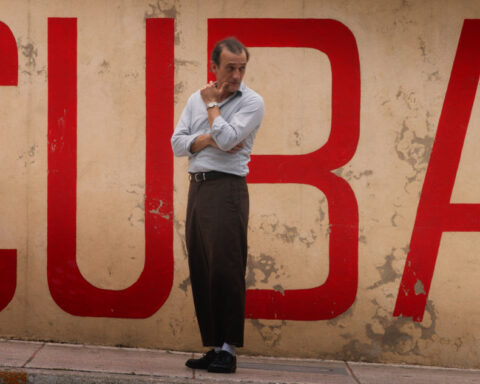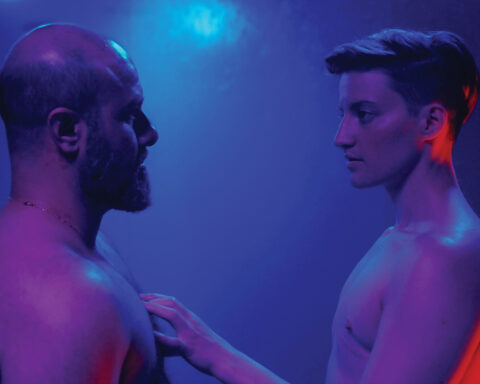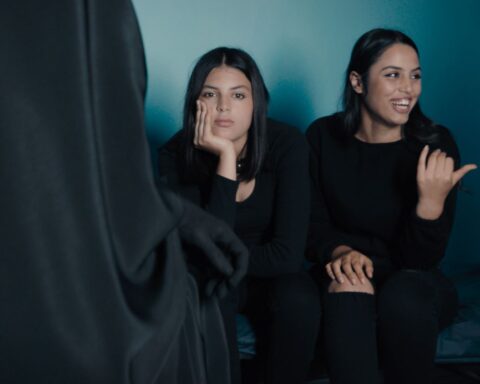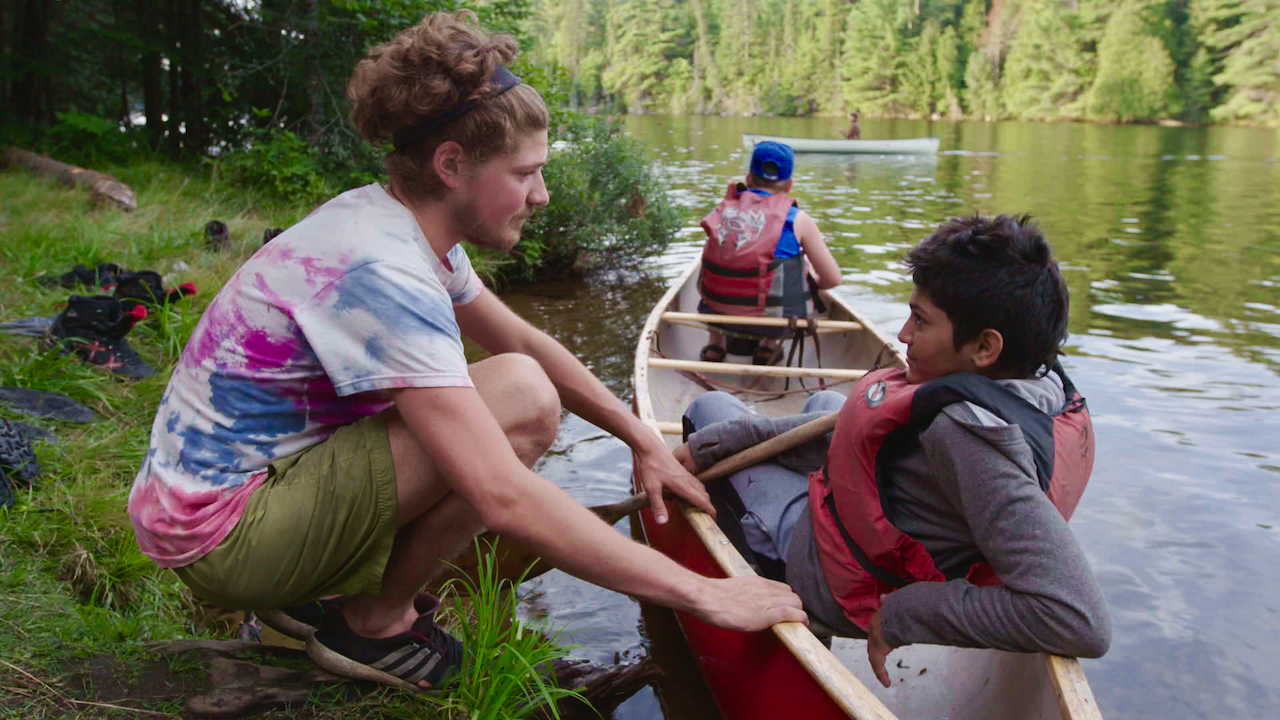The Invisibles: We Want to Live
(Germany, 110 min.)
Dir. Claus Räfle
Past, present, fact, and fiction weave an effective collage in The Invisibles. This powerful doc-drama hybrid tells the story of the 1700-odd German Jews who disappeared beneath the surface of Berlin and survived for years, long after Joseph Goebbels declared the city “free of Jews” in 1943. The Invisibles thrusts audiences into the lives of four of these survivors—Cioma Schönhaus, Hanni Lévy, Ruth Arndt, and Eugen Friede—as they escape the Nazi death camps by going undercover and blending into the action of everyday Berlin thanks to the help of some German allies, keen survival skills, and fortunate luck. The survivors tell their stories in interviews while director Claus Räfle offers dramatic re-enactments of the Berliners’ lives to immerse audiences in the “invisible” world of wartime Germany. It’s a gripping tale of survival.
The Invisibles features compelling interviews from the survivors as they recall their experiences to Räfle. Their testimonies are recorded separately in conversations shot several years ago, but the memories are vivid and the details extraordinary. Each subject outlines an impressive survival story as he or she recalls the details that saved a life.
These interviews are dispersed throughout extensive dramatic interpretations of the survivors’ stories, reminding audiences that truth can be wilder than fiction. Cioma Schönhaus describes how he escaped the camps by recognizing the need for skilled labourers and telling a Nazi officer about his success (somewhat embellished) making bullets for the Germans. The younger Cioma, played by Max Mauff in the dramatizations, then survives by touring in and out of residences intended for billeting German officers. As the elder Schönhaus recalls small details, like making his bed in a host’s home, that could provide a few extra nights of safe shelter.
Schönhaus’s story is perhaps the strongest of them as he connects with the larger network of Jews hiding in Germany. Working as a forger to use his passion for art to aid his survival, the young man creates falsified passports and travel documents to help save the lives of fellow Jews. This side work brings considerable risks, but it also offers fair rewards as Schönhaus enjoys extra food stamps, which he can sell on the black market and live far more comfortably than his fellow “invisibles” who survive on any scraps they can.
Hanni Lévy, played in dramatic re-enactments by Alice Dwyer, describes how she survived by bleaching her hair and blending in among the crowds. Her narrative is like one of a flâneuse as she floats through Berlin, admiring shop displays and going to the movies to kill time and find shelter. Dwyer and Mauff are arguably the standouts of the narrative cast and make the most of their characters as Cioma and Hanni come fully to live with extra nuances and sparks, while Hanni’s physical transformation is especially striking as she looks sicklier by the scene, drained by lack of food and exhaustion from roaming the streets.
Ruth Arndt (Ruby O. Fee) also finds solace in the local cinema as she and her friend Ellen (Viktoria Schulz) find them a great site of refuge for the same reasons that Hanni does. The elder Arndt speaks of finding work in the home of a Nazi officer, and the dramatic scenes show how her younger self firted cautiously with the enemy to avoid detection while serving parties of Hitler’s men. Ruth, like Cioma, experiences a relatively comfortable life compared to the other invisibles given that her situation provides shelter and work, which helps her send food and money to her family members scattered throughout the city.
Finally, Eugen Friede, played by Aaron Altaras, occupies the middle ground of the other stories. While his tale is also one of relatively comfortable survival as he moves from home to home aided by a series of noble Berliners eager to do their part to help Jews survive the Nazi regime, the elder Friede describes memories of being shuffled from house to house and living in restless edginess as one had to measure every move to avoid irritating a noble host, most of whom were also on edge given that they were risking their lives to shelter a Jew. Unlike the others, who enjoy daylight and the outdoors in their stories, Friede’s tale confines itself to interiors as he finds love with a host family’s daughter or survives sequestered in small quarters with a family of four.
The survivors of The Invisibles do not intersect, but they are linked by minor characters, like Stella Goldschlag (Laila Maria Witt), a seductive Jewish woman who informed on her fellow Jews for the Nazis and crossed paths with both Cioma and Ruth. The characters are mostly united by common themes. Coming from different backgrounds and classes, they’re united by the will to live. They’re also connected by the heroism of everyday Berliners, people who risked their lives by standing out from the pack of wartime Germany and broke from the ideology of a single pure race. The interviewees all note their thanks to key people who helped save lives, in some cases at the expense of their own, and the dramatic counterparts do justice to their stories.
Räfle composes dramatic sequences that are superior to the average hybrid dramatic thread—the dramatic elements of many hybrids often resemble cheap British television—and The Invisibles honours the stories of the survivors with handsomely composed scenes that recreate wartime Berlin with striking details and authenticity. Even though the outcome for the four survivors is evident in their presence as elderly interviewees, the narrative threads remain consistently compelling as we watch the characters drift imperceptibly throughout the city. The Invisibles features a patchwork of archival elements to enhance the non-fiction character, but these snippets are mostly filler, like old B-roll, that evoke a sense of time and place. The strength of the dramatic elements also highlights the most effective element of the doc-drama hybrid structure: that of absence. There simply aren’t archival elements with which to tell this tale. The absence of photographs, records, films, and texts underscores the complete invisibility of the Jews who had to make themselves disappear, as well as the number of lives lost. The interplay of drama and documentary brings the past to life and makes the record of the four survivors all the essential.
The Invisibles opens in Toronto on Friday, April 5 at Hot Docs Ted Rogers Cinema.












